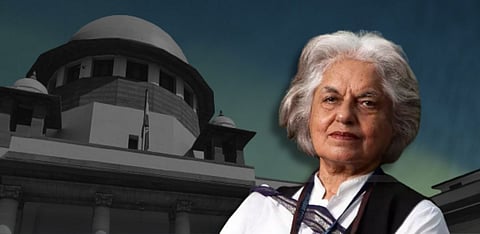

In her letter, Indira Jaising writes that there is a sense of discontent at the Bar after those with extensive experience in practice were not designated as seniors.
—
IN a letter to the Supreme Court's secretary-general, senior advocate Indira Jaising has urged the Supreme Court to reconsider the case of those advocates who have more than 25 years of practice and more than 50 reported cases to their credit but have been denied the senior gown in a recently held full court meeting.
In the meeting, as many as 56 advocates were conferred with the designation of senior advocates.
In her letter, Jaising writes that there is a sense of discontent at the Bar after those with extensive experience in practice were not designated as seniors.
She adds that this was perhaps for the reason that 25 marks are allotted to the interview and yet the interview itself was "collective" and lasted for "a few minutes only".
"To instill confidence in the process, it is in the fitness of things that the system provides one opportunity to those called for the interview and not designated to have the decision reviewed by the designating authority," Jaising says in her letter.
Jaising has also urged the Supreme Court to disclose the marks obtained by individual candidates as is done in some high courts to make the system transparent.
In 2017, on a petition filed by Jaising, the Supreme Court laid down objective criteria to designate senior advocates. This judgment introduced an objective system for assessing advocates based on a 100 Points Index.
The index allocates 40 points to the proposition of law advanced, expertise and pro bono work, 15 points to published articles, and 25 points for interviews or interaction with the applicant advocate.
This assessment is to be done by a permanent committee of the court, which is headed by the Chief Justice of the court and consists of the two next senior-most judges of the court.
The Attorney General for India, or the Advocate General of a state, in case of a high court, is also to be a member of the committee.
The above four members of the committee nominate another member of the Bar to be the fifth member of the committee.
While laying down these objective criteria, the court also stated that the guidelines enumerated may not be exhaustive of the matter and may require reconsideration by suitable additions and deletions in light of the experience to be gained over a period of time.
In May 2023, the Supreme Court, in what it described as fine-tuning of the judgment, reduced the 15 marks allotted for publishing articles to five. The court found that the 15 marks for publication were excessive, on the ground that most practising advocates find very little time to write academic articles.
The marks to be allotted for reported and unreported judgements, pro bono work and domain expertise of an applicant under various branches of law were increased from 40 to 50. The court also observed that due consideration should be given to diversity, particularly with respect to gender and first-generation lawyers.
The court, however, maintained the 25 marks for interviews overruling the arguments that the requirement of an interview would delay the designation process, considering the practical issue of interviewing many candidates.